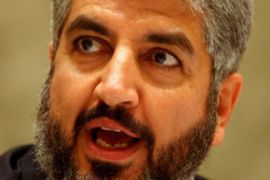Israel: No ceasefire without Shalit
Security cabinet insists captured soldier be freed before any deal can be considered.

Ehud Olmert, the Israeli prime minister, had previously insisted that Shalit be released before any long-term ceasefire could be agreed.
Shalit was captured in June 2006 in a cross-border raid by Palestinian fighters.
“We will negotiate his release first, and only then will we be willing to discuss things like the Gaza crossings and rebuilding the [Gaza] Strip,” Olmert said during a tour of Jerusalem on Tuesday.
Israel imposed an economic blockade on Gaza, a small coastal territory that is home to 1.5 million Palestinians, after Hamas seized de facto control of the territory from their Fatah rivals in June 2007.
Sensitive deal
Hamas has demanded the release of 1,400 Palestinians held in Israeli jails.
Jackie Rowland, Al Jazeera’s correspondent in Jerusalem, said that the prisoner-exchange deal was a sensitive issue for the security cabinet.
“It would involve the possible release of Gilad Shalit … Israel is aware that it would have to pay a price to get him back – that price being the release of hundreds of Palestinian prisoners from a list drawn up by Hamas,” she said.
“Most of those prisoners are people who Israel describes as having blood on their hands: people who have been convicted and imprisoned by Israeli courts for alleged murder or conspiring to murder.
Israel is likely to call for the release of Shalit before a long-term ceasefire with Hamas can be agreed, our correspondent said.
“The argument of Olmert – one largely supported by the security cabinet – is that this prisoner exchange would have to be agreed before Israel is actually willing to agree to a ceasefire arrangement with Hamas in the Gaza Strip,” she said.
Lasting agreement
Khaled Meshaal, Hamas’ exiled political leader, has said that Olmert’s position on releasing Shalit was not conducive to a lasting “period of calm” agreement between Hamas and Israel.
“There can be no calm unless the [Gaza] blockade is lifted and the crossings are opened. The issue of calm should not be linked to the issue of prisoner Shalit,” Meshaal said in Damascus on Tuesday.
 |
| Israel’s war on Gaza devastated the Hamas-controlled coastal territory [AFP] |
Olmert, whose term as prime minister is set to end soon, has suggested that a deal leading to Shalit’s release could take time.
“Even if Shalit’s case cannot be resolved while I am in office, the foundations we built will facilitate in his release,” he said on Tuesday.
Egyptian officials have in recent weeks tried to secure a long-term ceasefire deal between Hamas and Israel, following Israel’s war on Gaza.
Hamas and Israel, which refuse to deal with each other directly, have each had ceasefire orders in place since January 18, but a bilateral truce has so far proved elusive.
Coalition consultations
The Israeli security council meeting came just hours before Shimon Peres, the country’s president, was due to begin consultations with political parties on the formation of a new government, following an indecisive general election.
The centrist Kadima party, led by foreign minister Tzipi Livni, won 28 seats in the parliament, just one more than Benjamin Netanyahu’s Likud party.
Despite Livni’s narrow election victory, Netanyahu appears to have the backing of more parliamentarians in the 120-member Knesset [Israeli parliament] and is, therefore, tipped as the leader Peres is most likely to invite to form a coalition government.
While official election results are due on Wednesday evening, Peres has until February 25 to name the new prime minister.